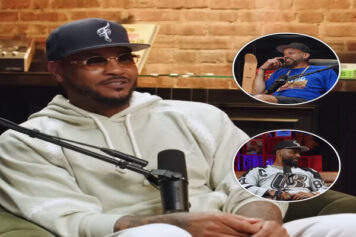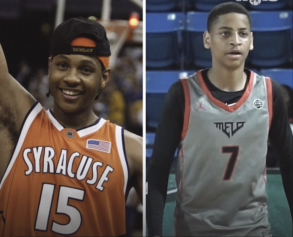The First To Do It opens with the West Virginia State University head basketball coach driving to see Earl Lloyd in the hospital. From there, we begin to move through time by way of some of the individuals Lloyd went to school with.
Using the DNA of yellowed, antiquated newspaper clippings and black and white television footage juxtaposed against commentary from friends and family members, as well as the analysis from journalists and sports historians, The First To Do It is a proper, respectful and sincere historic account of the first Black player to grace the National Basketball Association, and the first Black professional basketball coach, as well.
Directed by Coodie Simmons and Chike Ozah, with narration by Deon Cole, the film not only provides genuine insight into the trials and tribulations that Lloyd faced in segregationist America, but it also gives the viewer an intimate look into the cohesiveness that was a byproduct of growing up in a world that screamed, ‘It’s Us Against Y’all’.
But there was no hate in Earl Lloyd. Only a true love for basketball and people.
Despite all that was going on in the world when he was playing in college, Lloyd’s words emphasize how the close-knit community he encountered while attending West Virginia State University was instrumental in helping form his ideas about the broader American struggle for Black people.
Through the narrator, we hear of all the particulars of Lloyd’s life. We hear about how a schoolmate was the one who informed him that he drafted by the Washington Capitols, and how engaging with teammates in that locker room was the first time he had a conversation with white people in an intimate setting.
For extreme basketball historians, Earl Lloyd’s then-NBA record for personal fouls is relatively common knowledge. The vast majority of the first Black NBA players were called upon to do the dirty work; rebounding, enforcing the paint, and man-to-man defense on the other team’s best player.
While with the Syracuse Nationals, Lloyd’s primary job was to defend the other player’s best player and provide some muscle for star player and future NBA Hall of Famer Dolph Schayes. This is where we find that Lloyd’s offensive abilities were purposefully curtailed due to scheme and coaching.
The story continues by informing us that, following a injury to Schayes, Lloyd was called upon to be more assertive on offense and averaged 25 points per game in the span. That tells us all we need to know about how a false interpretation of his career stats of eight points and six rebounds are very misleading when used to calibrate just how good he really was.
The problem with being a lockdown defender is effort seldom shows up in a player’s stats. We would have to search out the star player who he was actually defending to see what the real deal was.
We also see Lloyd become the first Black basketball coach with the Detroit Pistons, and how he was eventually fired for having a poor record. He insisted that his Black assistant coach Ray Scott take the position, despite his loyalty to Earl. Again, Lloyd’s dedication to the uplifting of, and his compassion for, the Black community was on full display following his coaching days as well.
A staple of Detroit, Lloyd was described as something of a Black ambassador, within inroads to city government, the automotive industry and he even acted as a liaison between the police department and the Black community — with respect and admiration coming from both sides.
In addition commentary from former players, friends and relatives, both Carmelo Anthony and Kawhi Leonard, who serve as executive producers on the project, were very candid in accessing how spiritually herculean and mentally centered Lloyd had to have been to withstand the things he did, and to still rise from it all. A point to consider when viewing the film is how Lloyd’s professionalism and behavior smoothed the way for the likes of Bill Russell and Wilt Chamberlain.
Just 15 years after Earl Lloyd was drafted, more than half the NBA would be Black. An astonishing feat, and Earl’s refusal to succumb to racist taunts, questionable officiating and dirty play was directly responsible for the ascension of those other greats a decade or so later.
Not only is The First to Do It worth watching from a basketball perspective, but from a historic and cultural point of view as well.



